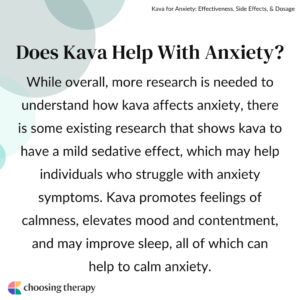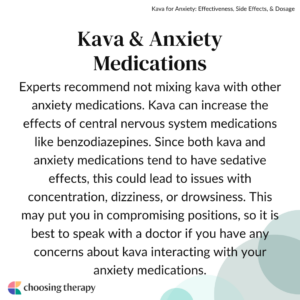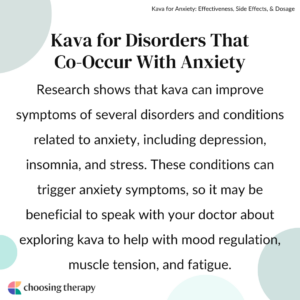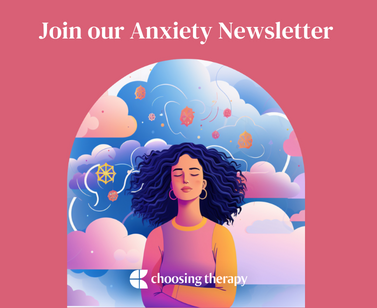Studies have shown kava to be a potential treatment for anxiety. There is interest in the use of kava as an alternative treatment for anxiety because of evidence that kava could affect the brain in a way similar to taking anti-anxiety medications without the risks and side effects.1 Although promising, more research is needed, so explore kava for anxiety with caution.
Ketamine Program For Depression, Anxiety, and Trauma Nue.life offers an at-home, evidence-based ketamine program supported by hundreds of clinical studies. Our clients feel rapid & lasting relief within hours after the first treatment. Learn More
What Is Kava?
The kava plant is a shrub that belongs to the pepper family that grows throughout the Pacific Islands. Considered sacred in these societies, kava is traditionally served as a drink during significant events such as weddings and funerals. Kava is also considered an herbal remedy, making it popular with those looking for more natural ways to manage symptoms such as anxiety. Other uses for kava include pain reliever, muscle relaxant, and insomnia relief.2,3,4
Kava is not currently regulated by the U.S. Food and Drug Administration (FDA). This can lead to inconsistencies across kava-related products, meaning you may not always know how much, what kind you are, or where you’re getting kava.
Kava Forms & Doses
Kava can be found in several different forms, including tea, liquid, powder, and capsules. When buying kava, look for products that clearly list kavalactone content and all other ingredients. Most experts recommend not exceeding a kavalactone dosage of 250 mg daily.5 When considering taking a supplement, it is important to check with your doctor first.
Kava is available in the following forms and doses:
- Kava tea: Kava can be blended and brewed in hot water to produce kava tea. It can also be combined with other herbs known to have relaxing effects. Up to three cups of kava tea are recommended daily.
- Kava liquid: Kava can be found in a liquid form, often called a tincture. Kava in liquid form is more concentrated than in other forms, and a small dose is recommended. The FDA does not provide recommended guidelines on how to use kava in liquid form, so seek out trusted brands of kava liquid and follow the directions on the bottle.
- Kava powder and capsules: In powder form, kava can be used to make a drink or can be put into capsules and swallowed. For adults, the expert recommended a daily dose of kava as a dietary supplement capsule, which is one to three capsules or 60-250 mg of kavalactones for a duration of one to two months.2
Does Kava Help With Anxiety?
While overall, more research is needed to understand how kava affects anxiety, there is some existing research that shows kava to have a mild sedative effect, which may help individuals who struggle with anxiety symptoms.6 Kava promotes feelings of calmness, elevates mood and contentment, and may improve sleep, all of which can help to calm anxiety.6
One study indicated that kava caused similar improvements in brain wave activity to benzodiazepines, a widely used class of anti-anxiety medications. This suggests that kava may produce similar calming effects to other anti-anxiety drugs.6 Benzodiazepines can have unwanted side effects as well as the potential for addiction. Due to these risks, kava can be an attractive alternative treatment for anxiety.
Kava for Social Anxiety
Kava has been most widely studied for the treatment of generalized anxiety disorder (GAD); however, researchers are expanding into other diagnoses under the umbrella of anxiety. One study documented symptom improvement of 75% for an individual who had both GAD and social anxiety after a 4-week round of kava treatment.7
Since kava is documented as having calming effects, it may be helpful for individuals who experience social anxiety to promote feelings of relaxation prior to gatherings, interviews, meetings, or other triggering events.
Kava for Panic Attacks
Kava may be helpful for people as an alternative treatment to rescue medications for panic attacks because it can stop rumination, which is often a trigger for panic attacks. Furthermore, research indicates kava as an effective short-term treatment for anxiety, but not for longer than eight weeks at a time.9 Therefore, it may be best used for peaks in anxiety, such as panic attacks, rather than a long-term treatment for anxiety symptoms.
How Much Kava Should Someone Take for Anxiety?
When considering taking kava for anxiety, the expert recommended effective dosage range of kavalactones is 70-250 mg.8 Dosing may be found in milligrams (mg) or as a percentage. Percentages can be converted to milligrams. Consider starting at the lowest recommended dosage and gradually increasing as needed.
When using herbal supplements like kava for anxiety, it’s important to remember that there can be negative side effects despite the natural origin of the product. Therefore, only use these supplements when needed, at recommended doses, and for recommended periods of time. Stay aware of new research and recommendations from experts. Most experts recommend not using kava for longer than three months.
Kava & Anxiety Medications
Experts recommend not mixing kava with other anxiety medications. Kava can increase the effects of central nervous system medications like benzodiazepines. Since both kava and anxiety medications tend to have sedative effects, this could lead to issues with concentration, dizziness, or drowsiness.6 This may put you in compromising positions, so it is best to speak with a doctor if you have any concerns about kava interacting with your anxiety medications.
Psychiatry For Anxiety Looking for anxiety treatment that prioritizes you? Talkiatry can help. Find an in-network psychiatrist you can see online. Get started with our short assessment.
Kava for Anxiety Side Effects & Risks
There are many factors specific to each individual that may alter the short-term and long-term effects associated with kava for anxiety use. It is always best to talk to a healthcare professional you trust before starting any new medication or supplement, including kava. Though research has been conflicting, kava use has been linked to liver damage, particularly when taken with alcohol or in extract form.4,9 Kava for anxiety use is especially not recommended if you are already taking anti-anxiety medications, anti-seizure medications, or diuretics.
Kava for Disorders That Co-Occur With Anxiety
Research shows that kava can improve symptoms of several disorders and conditions related to anxiety, including depression, insomnia, and stress.6,7,9 These conditions can trigger anxiety symptoms, so it may be beneficial to speak with your doctor about exploring kava to help with mood regulation, muscle tension, and fatigue.7
Kava may help with the following disorders that co-occur with anxiety:
- Depression: Depression and anxiety are common co-occurring disorders. Kava is documented as elevating mood, which may help with irritability caused by anxiety and low mood caused by depression.6
- Insomnia: Insomnia and anxiety commonly co-occur when someone has issues with restlessness and difficulty controlling worry. Kava may be used to help someone get to sleep or stay asleep by promoting feelings of calmness as a mild sedative before bed.
- Stress: Kava is documented as promoting feelings of well-being and contentment, which can help combat stress and anxiety. Kava is also documented as helping with muscle tension and fatigue, which are also common during periods of stress.7
When to Seek Professional Help for Anxiety
Anxiety is a very real challenge for many, and it’s important to remember that you are not expected to treat anxiety on your own. If you are experiencing distress in any area of your life as a result of your anxiety, you might want to talk to a therapist. If you’re not sure where to start, try an online therapist directory to find a therapist. While there are many online therapy options, you may benefit from finding therapy in person.
Treatment for Anxiety
There are many treatments for anxiety that one can explore aside from kava for anxiety. For some, lifestyle changes are enough to calm their anxiety. For others, working with a mental health professional can help to develop coping skills for anxiety. In some cases, medication may be prescribed to help treat anxiety. Each individual struggling with anxiety may need a different combination of these treatment options in order to treat their anxiety.
Options For Anxiety Treatment
Talk Therapy – Get help from a licensed therapist. Betterhelp offers online therapy starting at $65 per week. Free Assessment
Psychiatry for Anxiety – Looking for anxiety treatment that prioritizes you? Talkiatry can help. Find an in-network psychiatrist you can see online. Get started with our short assessment. Visit Talkiatry
Treatment options for anxiety include:
Therapy
Therapy works to address both the symptoms and root causes of anxiety. There are many options for anxiety therapy available, like individual counseling, group therapy, and support groups. Therapists can identify a frequency and duration of sessions that may best help each individual, though weekly sessions are often recommended at the start of therapy.
Effective types of therapy for anxiety include:
- Cognitive behavioral therapy (CBT): Using CBT for anxiety can help change negative thought patterns that fuel anxiety. Additionally, CBT can address behaviors, such as avoidance, that may relate to anxiety.
- Dialectical behavior therapy (DBT): DBT for anxiety can provide skills for mindfulness, distress tolerance, and emotional regulation. Learning skills that address each of these areas can help in the treatment of anxiety.
- Exposure therapy: Exposure therapy for anxiety can help with fear and avoidance common in anxiety. In this type of therapy, therapists create a safe environment for repeated exposure to objects, activities, or situations that cause distress, reducing anxiety over time.
- Eye movement desensitization and reprocessing (EMDR): EMDR for anxiety uses directed eye movements paired with imagining distressing scenarios. Through EMDR, attention is shifted to more positive thoughts, helping to decrease anxiety.
- Safe and sound protocol (SSP): The SSP is a music-based therapy. Evidence has shown that listening to the SSP is effective in treating anxiety, as it helps with emotional regulation and a sense of safety.
- Acceptance and commitment therapy (ACT): ACT can be an effective therapy for the treatment of anxiety. ACT for anxiety teaches skills for ending the struggle with anxiety and can help take actions that are more aligned with values as opposed to based on anxiety.
Medication
Some people are prescribed medication as part of their anxiety treatment plan, often in combination with therapy. Starting a prescribed medication can feel like a big decision, and it’s important to find a psychiatrist you trust. Anxiety medication can work well alongside therapy.
Common medications prescribed for anxiety include:
- Antidepressants: SSRIs, SNRIs, and tricyclic antidepressants may be prescribed for anxiety. Taking these antidepressants may help anxiety by increasing the amount of chemicals such as serotonin, norepinephrine, and dopamine available in the brain.
- Beta blockers: Beta blockers can block the effects of neurotransmitters that relate to the fight-or-flight response. Beta blockers may best help with short-term, situational anxiety.
- Benzodiazepines: Benzodiazepines can be effective in the treatment of anxiety; however, they do come with the risk of misuse and addiction. Benzodiazepines work to increase calming chemicals in the brain.
- Buspirone: Buspirone is an anxiolytic that can be prescribed for the treatment of anxiety. Buspirone can treat short-term symptoms associated with GAD.
Lifestyle Changes
Joyful movement and exercise can decrease anxiety by releasing feel-good chemicals. Additionally, learning and practicing mindfulness for anxiety, as well as regulating breathing exercises, may help to relax anxiety. Making these lifestyle changes can be difficult, but change can start with setting a specific goal.
Common lifestyle changes to help cope with anxiety include:
- Getting regular exercise
- Practicing meditation for anxiety
- Maintaining a healthy diet while focusing on foods that help anxiety
- Getting enough sleep
- Setting healthy boundaries around screen time, including the use of social media
- Practicing breathing exercises for anxiety
- Limiting alcohol and caffeine
Frequently Asked Questions
Is kava a natural Xanax?


Kava is sometimes referred to as a natural Xanax because it promotes feelings of calmness and relaxation, similar to Xanax. Both kava and Xanax are central nervous system depressants, meaning that they slow brain activity. Kava is documented as having mild sedative effects, which could be compared to taking a small dose of Xanax.
Is kava or ashwagandha better for anxiety?


Both kave and ashwagandha for anxiety have potential benefits for improving symptoms. However, both herbal remedies also have documented concerns for long-term liver toxicity.6,10 For short-term use, ashwagandha may be better for people who need help with both anxiety and improved memory or cognitive functioning.10 Kava may be better for improving fatigue, low mood, and restlessness.
Is kava safe to take daily?


Experts indicate kava may not be safe for long-term or daily use because of the potential for liver toxicity.6 There is no FDA-recommended safe dosage for kava. Experts stress that kava should not be ingested for more than four weeks.6 Kava also has potential drug interactions that may affect other daily medications you take, so it is important to consult a doctor about use.
In My Experience
Additional Resources
To help our readers take the next step in their mental health journey, Choosing Therapy has partnered with leaders in mental health and wellness. Choosing Therapy is compensated for marketing by the companies included below.
Talk Therapy
Online-Therapy.com – Get support and guidance from a licensed therapist. Online-Therapy.com provides 45 minutes weekly video sessions and unlimited text messaging with your therapist for only $64/week. Get Started
Virtual Psychiatry
Hims / Hers If you’re living with anxiety or depression, finding the right medication match may make all the difference. Connect with a licensed healthcare provider in just 12 – 48 hours. Explore FDA-approved treatment options and get free shipping, if prescribed. No insurance required. Get Started
Anxiety Newsletter
A free newsletter from Choosing Therapy for those impacted by anxiety. Get helpful tips and the latest information. Sign Up
Learn Mindfulness, Meditation, & Relaxation Techniques
Mindfulness.com – Change your life by practicing mindfulness. In a few minutes a day, you can start developing mindfulness and meditation skills. Free Trial
Choosing Therapy Directory
You can search for therapists by specialty, experience, insurance, or price, and location. Find a therapist today.
Online Anxiety Test A few questions from Talkiatry can help you understand your symptoms and give you a recommendation for what to do next. How Does ERP Help With Intrusive Thoughts? Obsessive compulsive disorder (OCD) is a psychiatric condition marked by the presence of obsessive thoughts, images, doubts, or urges, followed by compulsive behaviors or acts aimed at easing the distress caused by the obsession. While the content of the obsessions can take many forms, they are always repetitive, persistent, involuntary, and intrusive, and they often result in a great deal of anxiety for the person experiencing them.

Choosing Therapy strives to provide our readers with mental health content that is accurate and actionable. We have high standards for what can be cited within our articles. Acceptable sources include government agencies, universities and colleges, scholarly journals, industry and professional associations, and other high-integrity sources of mental health journalism. Learn more by reviewing our full editorial policy.
-
Rex, A., Morgenstern, E., & Fink, H. (2002). Anxiolytic-like effects of kava-kava in the elevated plus maze test–a comparison with diazepam. Progress in neuro-psychopharmacology & biological psychiatry, 26(5), 855–860. https://doi.org/10.1016/s0278-5846(01)00330-x
-
Bian, T., Corral, P., Wang, Y., Botello, J., Kingston, R., Daniels, T., Salloum, R. G., Johnston, E., Huo, Z., Lu, J., Liu, A. C., & Xing, C. (2020). Kava as a Clinical Nutrient: Promises and Challenges. Nutrients, 12(10). https://doi.org/10.3390/nu12103044
-
Chua, H. C., Christensen, E. T., Hoestgaard-Jensen, K., Hartiadi, L. Y., Ramzan, I., Jensen, A. A., Absalom, N. L., & Chebib, M. (2016). Kavain, the Major Constituent of the Anxiolytic Kava Extract, Potentiates GABAA Receptors: Functional Characteristics and Molecular Mechanism. PloS one, 11(6), e0157700. https://doi.org/10.1371/journal.pone.0157700
-
Soares, R. B., Dinis-Oliveira, R. J., & Oliveira, N. G. (2022). An Updated Review on the Psychoactive, Toxic and Anticancer Properties of Kava. Journal of clinical medicine, 11(14), 4039. https://doi.org/10.3390/jcm11144039
-
Teschke, R., Sarris, J., & Lebot, V. (2011). Kava hepatotoxicity solution: A six-point plan for new kava standardization. Phytomedicine : international journal of phytotherapy and phytopharmacology, 18(2-3), 96–103. https://doi.org/10.1016/j.phymed.2010.10.002
-
Mount Sinai. (n.d.). Kava kava. Retrieved on March 22, 2024 from https://www.mountsinai.org/health-library/herb/kava-kava
-
Boerner R. J. (2001). Kava kava in the treatment of generalized anxiety disorder, simple phobia and specific social phobia. Phytotherapy research : PTR, 15(7), 646–647. https://doi.org/10.1002/ptr.1006
-
Sarris, J., Stough, C., Bousman, C. A., Wahid, Z. T., Murray, G., Teschke, R., Savage, K. M., Dowell, A., Ng, C., & Schweitzer, I. (2013). Kava in the treatment of generalized anxiety disorder: a double-blind, randomized, placebo-controlled study. Journal of clinical psychopharmacology, 33(5), 643–648. https://doi.org/10.1097/JCP.0b013e318291be67
-
Smith, K., & Leiras, C. (2018). The effectiveness and safety of Kava Kava for treating anxiety symptoms: A systematic review and analysis of randomized clinical trials. Complementary therapies in clinical practice, 33, 107–117. https://doi.org/10.1016/j.ctcp.2018.09.003
-
National Institute of Health. (2023, Oct 24). Ashwagandha: Is it helpful for stress, anxiety, or sleep? Retrieved March 22, 2024 from https://ods.od.nih.gov/factsheets/Ashwagandha-HealthProfessional/

We regularly update the articles on ChoosingTherapy.com to ensure we continue to reflect scientific consensus on the topics we cover, to incorporate new research into our articles, and to better answer our audience’s questions. When our content undergoes a significant revision, we summarize the changes that were made and the date on which they occurred. We also record the authors and medical reviewers who contributed to previous versions of the article. Read more about our editorial policies here.
Author: Amanda Stretcher, MA, LPC, S (No Change)
Medical Reviewer: Kristen Fuller, MD (No Change)
Primary Changes: Added sections titled “Does Kava Help With Anxiety?”, “Kava for Social Anxiety”, “Kava for Panic Attacks”, “Kava & Anxiety Medications”, “Kava for Disorders That Co-Occur With Anxiety”, and “FAQ”. New content written by Christina Canuto, LMFT-A, and medically reviewed by Kristen Fuller, MD. Fact-checked and edited for improved readability and clarity.
Author: Amanda Stretcher, MA, LPC, S
Reviewer: Kristen Fuller, MD

Your Voice Matters
Can't find what you're looking for?
Request an article! Tell ChoosingTherapy.com’s editorial team what questions you have about mental health, emotional wellness, relationships, and parenting. The therapists who write for us love answering your questions!
Leave your feedback for our editors.
Share your feedback on this article with our editors. If there’s something we missed or something we could improve on, we’d love to hear it.
Our writers and editors love compliments, too. :)








